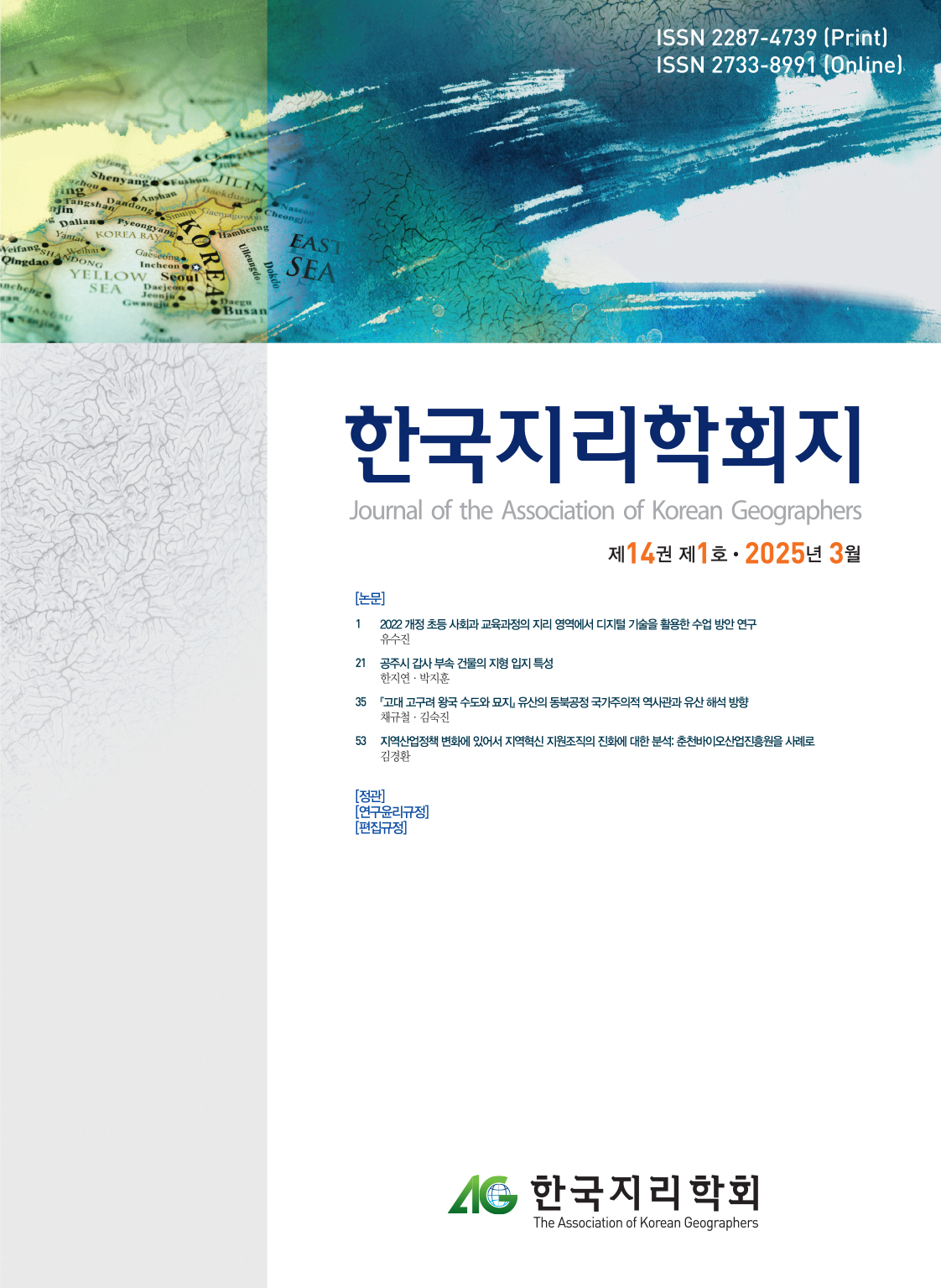Research Article
Abstract
References
Information
Today, in geography education, ecological transformation education can be said to be a task-oriented role for ‘a sustainable world for the well-being and coexistence of oneself and society as an ecological citizen.’ Based on these premises, this study analyzed the necessity and content of ecological environmental approach education in the direction of education suggested by UNESCO and OECD as future education. In addition, I analyzed the direction of ecological approach education in geography education focusing on the Australian geography curriculum revised in 2022 and the Ontario geography curriculum revised in Canada in 2023. Based on this, I suggested five directions for implementing an ecological approach to geography education. First, education to foster ecological capacity, second, education to foster transformative capacity and agency, third, expansion to education that can predict and imagine the future world based on sustainability, fourth, strengthening of natural environment education including climate change response, biology, and ecosystem, fifth, application of regional perspectives in ecological environmental approach education to present the contribution of geography education in terms of reality and effectiveness.
오늘날 지리교육에서 생태환경적 전환 교육은 ‘생태시민으로서 자신과 사회의 웰빙과 공존을 위한 지속가능한 세계’를 위한 과업적 역할이라고 할 수 있다. 이러한 전제를 토대로 본 연구에서는 UNESCO, OECD에서 미래 교육으로 제시하고 있는 교육의 방향에서 생태환경적 접근 교육의 필요성과 내용을 분석하였고, 최근 2022년에 개정한 오스트레일리아 지리교육과정과 2023년에 개정한 캐나다의 온타리오 주 지리교육과정을 중심으로 지리교육에서 생태환경적 접근 교육의 방향성을 분석하였다. 이를 토대로 지리교육에서 생태환경적 접근 교육의 실행 방향성으로 다섯 가지를 제시하였다. 첫째, 생태역량 함양의 교육, 둘째, 변혁적 역량과 행위 주체성 함양 교육, 셋째, 지속가능성을 토대로 미래 세계를 예측하고 상상할 수 있는 교육으로 확장, 넷째, 기후변화 대응, 생물, 생태계 등을 포함한 자연환경 교육의 강화, 다섯째, 생태환경적 접근 교육에서 지역적 관점의 적용을 통해 현실성과 실효성 면에서 지리교육의 기여를 제시하였다.
- 교육부, 2022, 「초・중등 교육과정 총론」, 고시 제2022-33호, 별책 1.
- 권상철, 2007, “환경문제에 대한 지리적 관점의 접근: 환경교육을 위한 일고,” 지리교육논집, 49, 1-12.
- 김가혜・신재열, 2017, “고등학교 한국지리 교과서 내 지형 및 생태환경 교육을 위한 현장학습 활동 프로그램 개발 -진주시 남강 유역을 중심으로,” 한국사진지리학회, 27(4), 117-135.
- 김다원, 2017, “지리교육의 기본개념 분석 연구: 국내외 지리교육과정 분석을 중심으로,” 한국지리학회지, 6(3), 319-337. 10.25202/JAKG.6.3.2
- 김다원, 2022, “지리교육에서 지속가능한 사회를 위한 적극적 시민성 함양의 환경교육 연구,” 한국지역지리학회지, 28(3), 350-366. 10.26863/JKARG.2022.8.28.3.350
- 김다원, 2023, “기후변화에 대응하는 자연지리 교육의 방향-초등 자연지리 교육을 중심으로-,” 대한지리학회지, 58(5), 503-519.
- 김미경・김경희・김현미・이수정, 2022, “미래교육 전망: UNESCO 교육의 미래와 OECD 교육 2030을 중심으로,” 한국교육과정평가원 연구보고 RRO 2022-1.
- 김병연, 2011, “생태 시민성 논의의 지리과 환경 교육적 함의,” 한국지리환경교육학회지, 19(2), 221-234. 10.17279/jkagee.2011.19.2.221
- 김병연・조철기, 2021, “학교 지리에서 기후정의 교육으로의 전환,” 한국지역지리학회지, 27(3), 422-439. 10.26863/JKARG.2021.8.27.3.422
- 남경희・조의호, 2013, “오스트레일리아 지속가능성 교육의 성립과 특징,” 홀리스틱교육연구, 18(1), 29-48.
- 서태열, 2003, “지구촌 시대의 ‘환경을 위한 교육’의 개념적 모형 재정립,” 한국지리환경교육학회지, 11(1), 1-12.
- 서태열, 2005, 「지리교육학 이해」, 파주: 한울.
- 신동경, 2024, “영국 역사교육에서 생태환경을 통합하려는 시도와 양상- A Level 교과서를 중심으로-,” 역사교육연구, 48, 165-202.
- 심광택, 2012, “지속가능한 사회과목표 설정: 생태적 다중 시민성,” 사회과교육, 51(1), 91-107.
- 심광택, 2017, “생태적 다중시민성과 교과 계통에 근거한 초등사회과 교실수업 설계,” 사회과교육, 56(3), 1-17. 10.37561/sse.2017.09.56.3.1
- 예경희, 2003, “영국의 생태계 모형 중심의 일반적 수준의 지리교육과정 계획,” 청주지리, 18, 1-34.
- 이경한, 2016, 「어린이의 지리학」, 서울: 푸른길.
- 이경한・김병연・조철기・최영은・김다원・이상훈, 2023, 「생태전환시대 생태시민성 교육」, 서울: 푸른길.
- 조재준・서미숙, 2023, “지속가능성을 위한 변혁교육의 비교적 고찰-환경교육, 지속가능발전교육, 그리고 생태전환교육을 중심으로,-” 한국지리환경교육학회지, 31(3), 19-32.
- 조철기, 2023, “생태시민성과 생태정의-에너지 시민성과 에너지 정의의 관점에서,” 「생태전환시대 생태시민성교육」, 서울: 푸른길, 57-100.
- 진소라・남상준, 2015, “생태문해력의 사회과교육적 의미 탐색,” 한국지리환경교육학회지, 23(3), 145-158.
- 채유정・남상준, 2015, “환경정의 관점에서 초등 사회 교과서 분석,” 한국지리환경교육학회지, 23(1), 101-112. 10.17279/jkagee.2015.23.1.101
- 홍서영, 2020, “지리교육에서 생태시민성 함양을 위한 아리스토텔레스 프로네시스(Phronēsis) 개념의 적용,” 한국지리학회지, 9(1), 51-65. 10.25202/JAKG.9.1.4
- Biddle(놀만 그레이브스 편저, 이경한 편역), 1999, “지리교육과정의 계획”, 「지리교육학 강의」, 351-398.
- Giddens, A., 2009, The Politics of Climate Change, Cambridge: Polity Press(홍욱희 역, 2009, 「기후변화의 정치학」, 서울: 에코 리브르).
- Graves, N., 1980, Geography in Education, London: Heinemann Educational(이희연 역, 1984, 「지리교육학 개론」, 서울: 교학연구사).
- Huckle, J., 1983, Environmental education, In Huckle, J.(ed), Geographical Education; Reflection and Action, Oxford: Oxford University Press.
- Linke, R.D., 1980, Environmental Education in Australia, HaperCollins Publishers Ltd.
- Mann, M. and Toles, T., 2016, The Madhouse Effect: How Climate Change Denial Is Threatening Our Planet, Destroying Our Politics, and Driving Us Crazy, Columbia: Columbia University Press(정태영 역, 2017, 「누가 왜 기후변화를 부정하는가」, 서울: 미래인). 10.7312/mann17786
- Morgan, A., 2006, Teaching Geography for Sustainable Future, In D. Balderstone(ed.), Secondary Geography Handbook, Sheffield: Geographical Association.
- OECD, 2018, The future of education and skills: Education 2030, Paris: OECD.
- OECD, 2019, OECD Future of education and skills 2030: OECD Learning Compass 2030, Paris: OECD.
- Pattison, W.D., 1964, The four traditions of geography, Journal of Geography, 63, 211-212. 10.1080/00221346408985265
- Standish, A., 2008, Global perspectives in the geography curriculum, London: Routledge(김다원, 고아라 역, 2015, 「글로벌 관점과 지리교육」, 서울: 푸른길). 10.4324/9780203890837
- Standish, A., 2012, The false promise of global learning, London: Continuum(김다원 역, 2020, 「글로벌 학습의 잘못된 약속」, 서울: 살림터).
- Takashi Tachibana, 1971, 思考の 技術-エコロジー的 發想のすすめ. 日本經濟新聞社(김경원 역, 2021, 「생태학적 사고법」, 서울: 바다출판사).
- UNESCO, 2012, Global Education First Initiative, Paris: UNESCO.
- UNESCO, 2015, Education 2030, Paris: UNESCO.
- UNESCO, 2021, Reimagining our futures together: A new social contract for education, Paris: UNESCO.
- Wallace-Wells, D., 2019, The Uninhabitable Earth- Life after warming, ew York: Tim Duggan Books(김재경 역, 2020, 2050 거주불능 지구, 서울: 수수밭).
- Walsche, N., Moula, Z., and Lee, E., 2022, Eco-Capabilities as a pathway to wellbeing and sustainability, Sustainability, 14(6), 1-24. 10.3390/su14063582
- 김은영, 2018, “OECD 교육 2030: 미래 교육과 역량”, 서울교육, 231호, https://webzine-serii.re.kr/oecd-%ea%b5%90%ec%9c%a1-20301-%eb%af%b8%eb%9e%98-%ea%b5%90%ec%9c%a1%ea%b3%bc-%ec%97%ad%eb%9f%89/
- ACARA, 2022, The Australian Curriculum, https://v9.australiancurriculum.edu.au/
- Department for Education of UK, 2013, Primary curriculum of the national curriculum in England, https://assets.publishing.service.gov.uk/media/5a81a9abe5274a2e8ab55319/PRIMARY_national_curriculum.pdf
- Ontario Ministry of Education, 2017a, The Ontario Curriculum, Grades 1-8 and The Kindergarten Program: Environmental Education, Scope and Sequence of Expectations, https://www.edu.gov.on.ca/eng/curriculum/elementary/environmental_ed_kto8_eng.pdf
- Ontario Ministry of Education, 2017b, The Ontario Curriculum, Grades 9-12: Environmental Education, Scope and Sequence of Expectations, https://www.edu.gov.on.ca/eng/curriculum/elementary/environmental_ed_kto8_eng.pdf
- Ontario Ministry of Education, 2023, Social Studies, History, and Geography, https://www.dcp.edu.gov.on.ca/en/curriculum/elementary-sshg/grades-list?curriculum_discipline=geography
- The Oxford Research Centre in the Humanities, https://www.torch.ox.ac.uk/about/who-we-are
- Publisher :The Association of Korean Geographers
- Publisher(Ko) :한국지리학회
- Journal Title :Journal of the Association of Korean Geographers
- Journal Title(Ko) :한국지리학회지
- Volume : 13
- No :3
- Pages :213~230
- DOI :https://doi.org/10.25202/JAKG.13.3.1



 Journal of the Association of Korean Geographers
Journal of the Association of Korean Geographers






